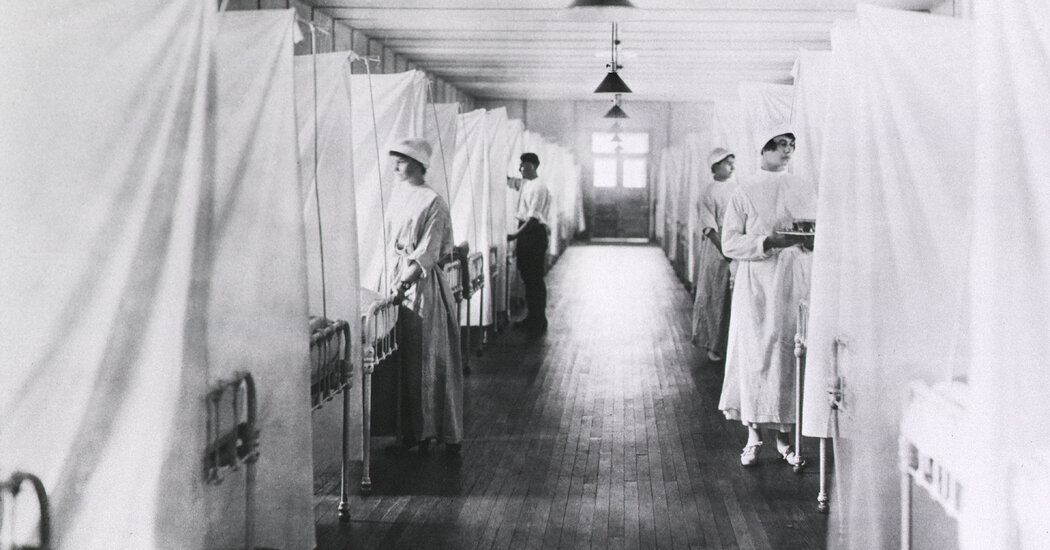
Most histories of the 1918 influenza pandemic that killed at least 50 million people worldwide say it ended in the summer of 1919 when a third wave of the respiratory contagion finally subsided.
Yet the virus continued to kill. A variant that emerged in 1920 was lethal enough that it should have counted as a fourth wave. In some cities, among them Detroit, Milwaukee, Minneapolis and Kansas City, Mo., deaths exceeded even those in the second wave, responsible for most of the pandemic’s deaths in the United States. This occurred despite the fact that the U.S. population had plenty of natural immunity from the influenza virus after two years of several waves of infection and after viral lethality in the third wave had already decreased.
Nearly all cities in the United States imposed restrictions during the pandemic’s virulent second wave, which peaked in the fall of 1918. That winter, some cities reimposed controls when a third, though less deadly wave struck. But virtually no city responded in 1920. People were weary of influenza, and so were public officials. Newspapers were filled with frightening news about the virus, but no one cared. People at the time ignored this fourth wave; so did historians. The virus mutated into ordinary seasonal influenza in 1921, but the world had moved on well before.
We should not repeat that mistake.
True, right now we have every reason for optimism. First, Omicron cases are declining in parts of the country. Second, nearly the entire U.S. population will soon have been either infected or vaccinated, strengthening their immune systems against the virus as we know it now. Third, although Omicron is extraordinarily good at infecting the upper respiratory tract, which makes it so transmissible, it seems less able to infect the lungs than earlier variants so it is less virulent. It is entirely possible and perhaps even likely that, spurred by a better immune response, the virus will continue to decrease in lethality; indeed, there is a theory that the 1889-92 influenza pandemic was actually caused by a coronavirus called OC43, which today causes the common cold.
All of which makes overconfidence, indifference or weariness, after two years of battling the virus — and one another — a danger now.
Signs of weariness — or misguided hope — are everywhere. Although more than 70 percent of the adult population is fully vaccinated, progress has stagnated, and as of Jan. 27, only 44 percent had received boosters, which provide vital protection against severe illness. Although most of us, especially parents, want schools to stay open, parents have gotten only about 20 percent of children ages 5 to 11 fully vaccinated. As in 1920, people are tired of taking precautions.
This is ceding control to the virus. The result has been that even though Omicron appears to be less virulent, the seven-day average for daily Covid-19 deaths in the United States has now surpassed the Delta peak in late September.
Worse, the virus may not be finished with us. Although there’s a reasonable likelihood that future variants will be less dangerous, mutations are random. The only thing certain is that future variants, if they are to be successful, will elude immune protection. They could become more dangerous.
That was the case not only in 1920 with the last gasp of the 1918 virus, but also in the 1957, 1968 and 2009 influenza pandemics. In 1960 in the United States, after much of the population had achieved protection from infection and a vaccine, a variant caused peak mortality to exceed the pandemic levels in 1957 and 1958. In the 1968 outbreak, a variant in Europe caused more deaths the second year, even though, once again, a vaccine was available and many people had been infected.
In the 2009 pandemic, variants also emerged that caused breakthrough infections; one study in Britain found “greater burden of severe illness in the year after the pandemic” but “much less public interest in influenza.” Researchers blamed the government’s approach for that. In the first year, the public health response was “highly assertive,” chiefly in providing information; there were no lockdowns. In the second year, they found, “the approach was laissez-faire.” As a result, “a large number of deaths, critical care and hospital admissions occurred, many of these in otherwise healthy people of working age.”
Such precedents should make us wary. Vaccines, the new antiviral drug Paxlovid and others could end the pandemic, once billions of doses become widely available globally and if the virus does not develop resistance. But the end is not going to arrive anytime soon. The immediate future still depends on the virus and how we wield our current arsenal: vaccines, masks, ventilation, the antiviral drug remdesivir and steroids and the one monoclonal treatment that still works against Omicron, social distancing and avoiding crowds. As a society, we have largely abandoned the public health measures on that list. As individuals, we can still act.
John M. Barry is a distinguished scholar at the Tulane University School of Public Health and Tropical Medicine and the author of “The Great Influenza: The Story of the Deadliest Pandemic in History.”




